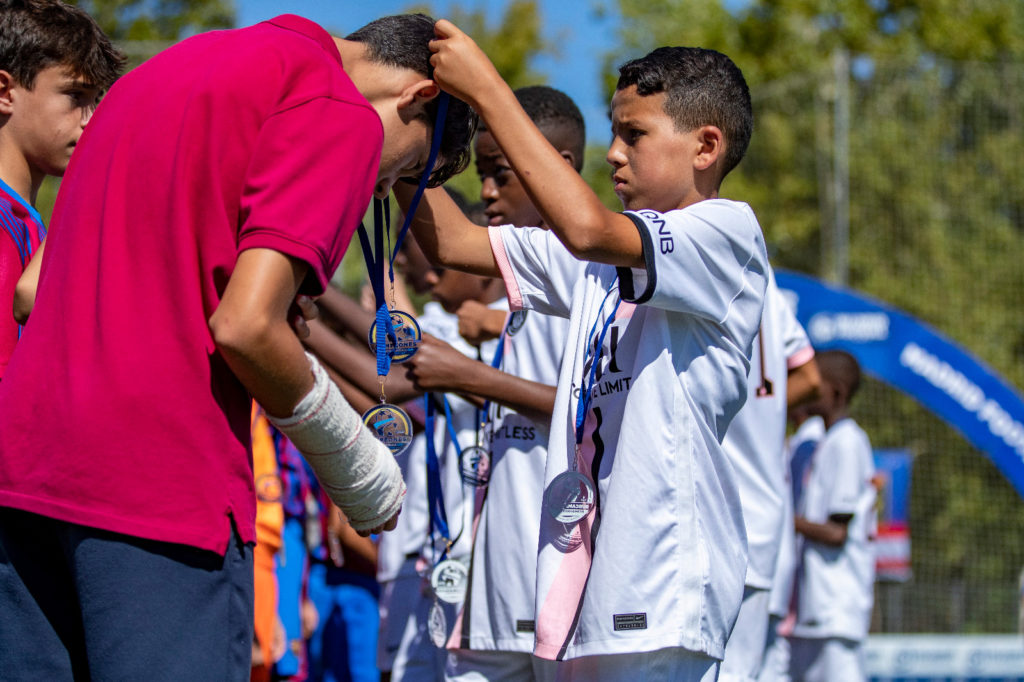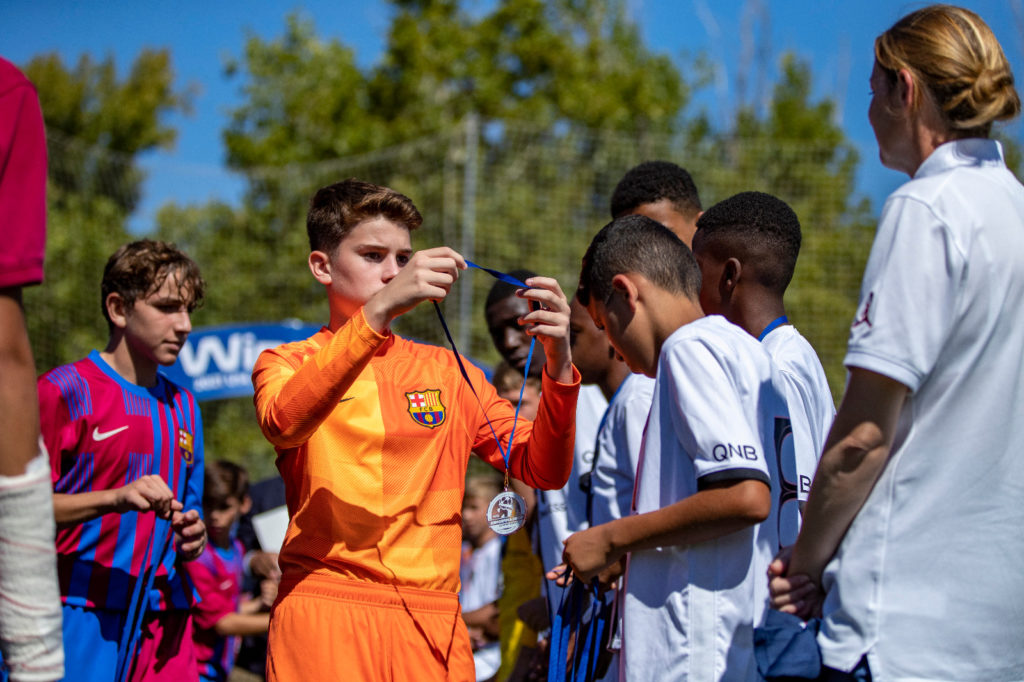During the past 17, 18 and 19 of September, the international U-14 soccer tournament Madrid Football Cup took place in the Madrid city of Alcobendas. Throughout these days, the twelve participating teams competed intensely to achieve the victory, which was finally won by FC Barcelona in a thrilling final against PSG.
Madrid Football Cup became during these days in the great festival of soccer training. An international tournament that brought together the best European teams, with young players that we may see in the near future to continue their professional career successfully in this beautiful sport.
The tournament stood out for a brilliant organization, in a complicated time for this type of events, reflecting the fantastic human team in charge of the different tasks of the tournament. Undoubtedly, people make the difference.
But it was also a tournament in which the values of sport were very present at all times. I remember some beautiful gestures of the athletes, like the one of a player cheering his teammate after the defeat, or the one of another player apologizing at the end of the game for a push he had given to an opponent without the ball. The player not only apologized to the opposing player, but later thanked the referees for correcting the action in the match. His coach, for his part, had also taken him off the field at the time of the foul, teaching him that this was not the way to go.

Respect and sportsmanship among the players, and also among the public. Shouts of encouragement, chants and even rattles and drums, but without insults or bad manners. Exemplary behavior. The good atmosphere generated by the staff of the organization of the event also contributed to all this, calling to order when necessary, but always in a polite manner and with a smile.
Another touching scene took place during the medal ceremony. The first and second placed teams stood face to face on the field. The champion team presented the silver medal to the runners-up, who in turn presented the gold medal to the champions. A beautiful gesture of mutual respect that contrasts with what we have seen on occasions at the professional level, when the players immediately take the silver medal off their necks or do not even want to hang it on their necks.
A colorful, cheerful and fun tournament, which also hinted at some difficulties. Throughout the competition, the stress among the players was palpable. There were many expectations placed on them. For 13- or 14-year-olds, it is difficult to manage that pressure. It was not only about competing in an international tournament against the best teams and the best players, but also about doing the best they could.
The knowledge that there were scouts at the tournament could put extra pressure through the players’ families, so how they handled the situation was vitally important. Many players were nervous, tense, and some even reflected in their faces the concern not to disappoint the expectations placed on them.
In addition to the stress of competition, there is also the stress that can be transferred from home. In these situations, messages of false confidence such as “you’re sure to win”, “you’re going to be the best”, “you’re sure to score a goal”, “you have to win the cup”, etc., do not help. Nor do bad faces or, even worse, criticism when things do not go as we would have liked, while good results are accompanied by compliments, photos for the networks or gifts. Without realizing it, through this type of behavior, we can make our children associate their personal worth with sporting success. And that is the best way to get our children to see not only their self-confidence but also their self-esteem affected.
The support to our children must be unconditional, valuing their effort and continuous improvement above the results.
Another difficulty associated with a tournament of these characteristics is the management that the coaches themselves make of the situation. Also at stake for them are their own expectations of results and their possible transcendence at the professional level. And in this sense, the most important thing is the ability of these coaches not to project their own needs on their players but to know how to convey the appropriate technical and tactical indications, transmitting serenity to the athletes. Communication plays, more than ever, a fundamental role.
As the competition progressed, it became evident that the teams that were a priori favorites were under greater pressure. Great results were expected of them. That is why it was so important for their coaches to manage both victories and defeats.
When a coach, driven by his own frustration, leaves the field of play after a defeat protesting, blaming the referee, injuries, or any other external factor, he is doing a disservice to his players. He is an example, he must not forget that. And as much as it hurts to lose, you must recognize the success of the rival, as well as learn from the mistakes made, also reinforcing all the positive things that the team has done. In training sports, this is a key aspect for the players’ sporting development.
To highlight its importance, the tournament awarded the prize for the best coach. On this occasion it went to the Rayo Vallecano coaching staff. This team came in fourth place, but deserved the award because its coach, in addition to his good sports management, knew how to handle all these situations perfectly with his players.
Tournaments of this level test not only the physical, technical and tactical quality of the teams but also their mental strength to face very stressful competition situations. They are very nice tournaments, in which sportsmanship and good soccer shine, becoming an unforgettable party.
Once it is over, we should only worry about the possible hangover of this party for some players, both for those who have been awarded or positively pointed out for their quality, as well as for those who have felt clearly inferior to their rivals. Both must learn to relativize, giving the right importance to the result, and continue with their sporting development through the objectives of achievement, that is, those objectives related to improvements in physical, technical, tactical and psychological aspects that depend on them and that will make them better footballers and better sportsmen.
Article vía: https://www.marca.com/blogs/espanasemueve/2021/09/29/la-psicologia-en-torneos-infantiles.html
Gema Sancho, psychologist and educational, sports and work coach (https://gemasancho.com/)
 Español
Español
